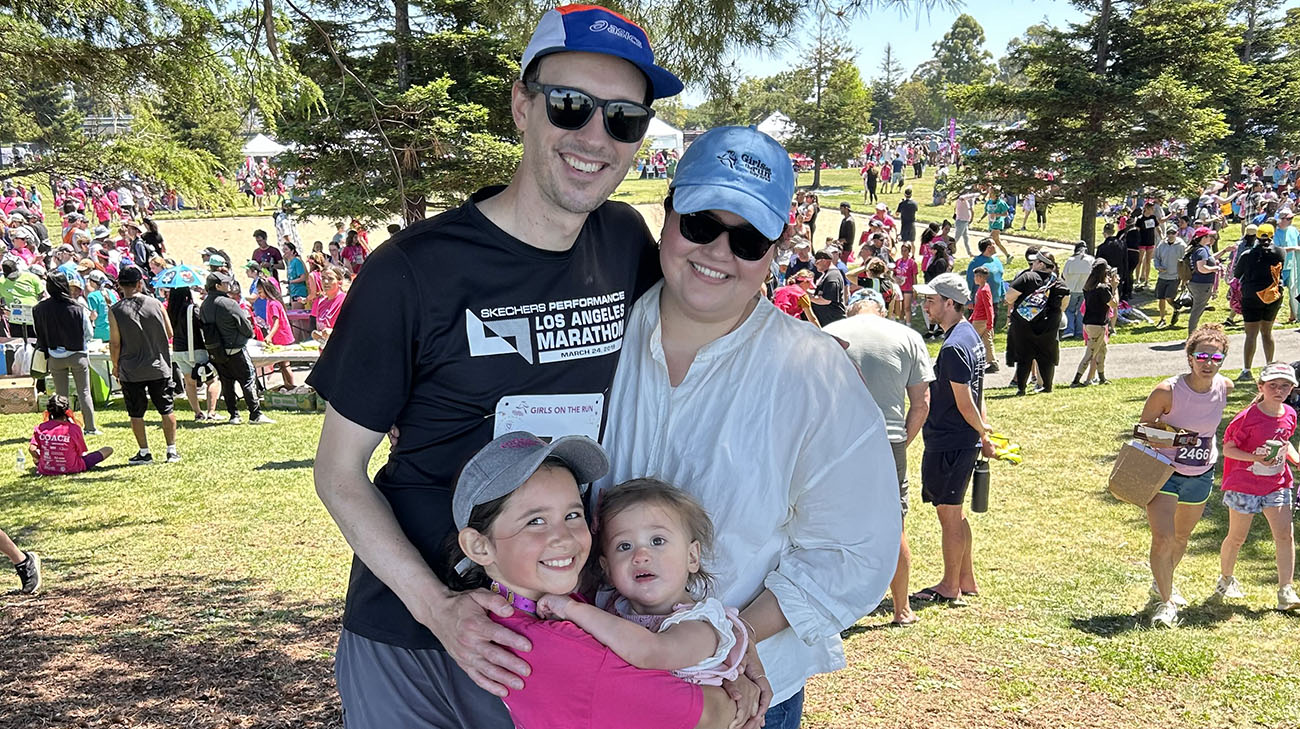
Chris Barry is an unlucky yet incredibly lucky man. He went from being bedridden at times to running his first marathon.
A 37-year-old husband and father of two young girls, Chris is now thriving following an intestinal transplant in August 2021 that saved his life.
In 2001 Chris’ mom had a routine colonoscopy that led to the discovery of a rare genetic disorder called Familial Adenomatous Polyposis (FAP), which significantly raises the risk of developing colorectal cancer.
Subsequent genetic testing on Chris showed he tested positive for the gene mutation. He was 14 years old.
After that discovery, doctors regularly monitored him for colon polyps, which typically number in the hundreds with FAP. At the age of 28, Chris had a colectomy, the surgical removal of the colon and rectum.
“Then, when I was 30 years old, I had abdominal pain and a fever,” Chris recalls. “I thought it was the flu or maybe appendicitis.” A trip to the emergency department revealed a desmoid tumor. Although these types of tumors typically grow slowly, Chris says his “was the size of an American football, about 11 inches.”
The desmoid tumor, which commonly occurs with FAP, was embedded in his small intestine. It perforated his bowel, and he became septic, a dangerous reaction to infection.
A California native, Chris consulted with and had been treated by specialists in Los Angeles and San Francisco.
Doctors told Chris he was initially too ill to receive chemotherapy for the desmoid tumor, so he remained in the hospital for six weeks to prepare to receive an intense regimen of chemotherapy treatment. Chris went through 100 continuous hours of chemo over five days, with a month to recover before another round.
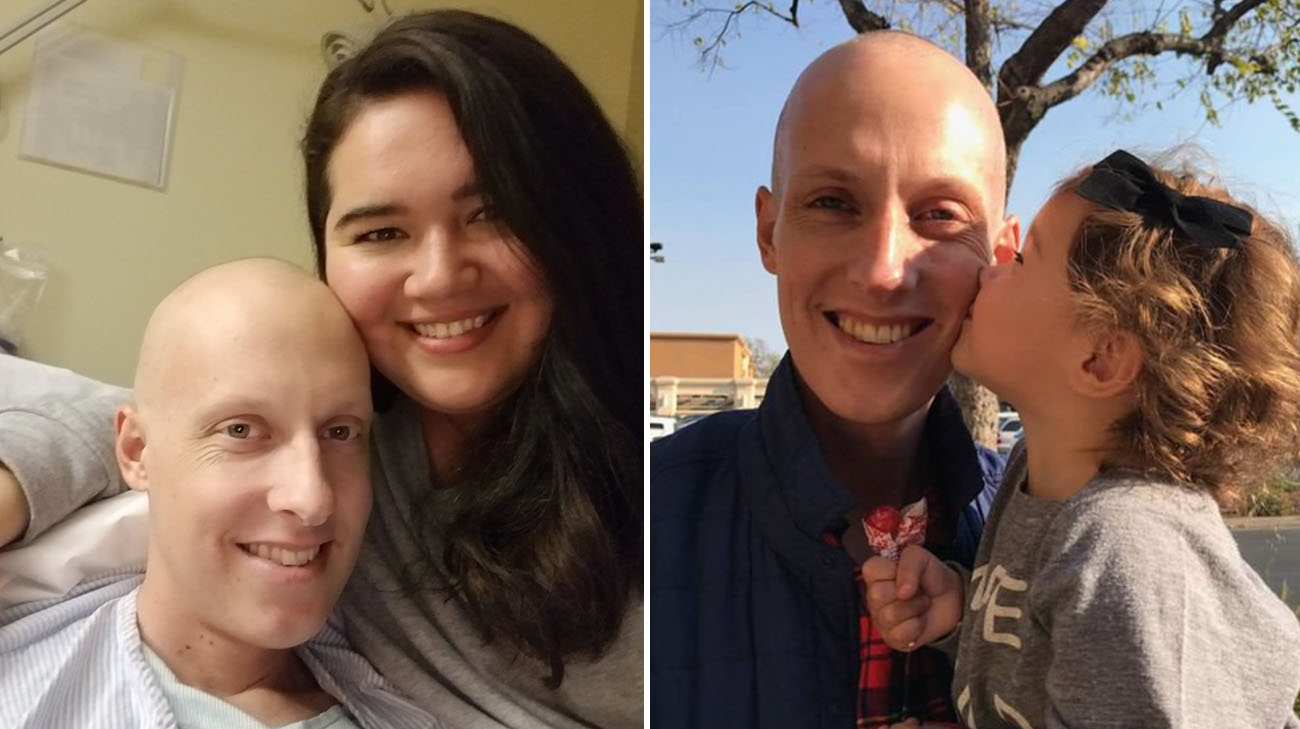
Chris initially received chemotherapy to try and shrink the desmoid tumor. (Courtesy: Chris Barry)
“The plan was to shrink the tumor so it could be surgically removed,” Chris says. “It shrunk by 40 percent in volume but was embedded around the mesenteric artery in the midsection of the digestive tract, so it could not be removed.”
In 2021, he became sick again. His bowel had perforated a second time, and he was unable to eat or drink. The tumor was growing.
“Doctors said they couldn’t do anything more at that time, which was disheartening,” Chris says. “I was really out of it with pain, so my wife and Dad communicated for me. I was open to anything at that point.”
Through a series of family and friend connections, Chris was referred to Anil Vaidya, MD, a transplant surgeon with Cleveland Clinic’s Intestinal Transplant Program.
From his first call with Dr. Vaidya, Chris learned of a possible treatment option. His desmoid tumor and the affected organ, the small intestine (bowel), could be removed and transplanted with the small intestine from an organ donor.
Chris remembers Dr. Vaidya saying, “That’s what we do (intestinal transplants) here; we can do that, and your life will greatly improve.”
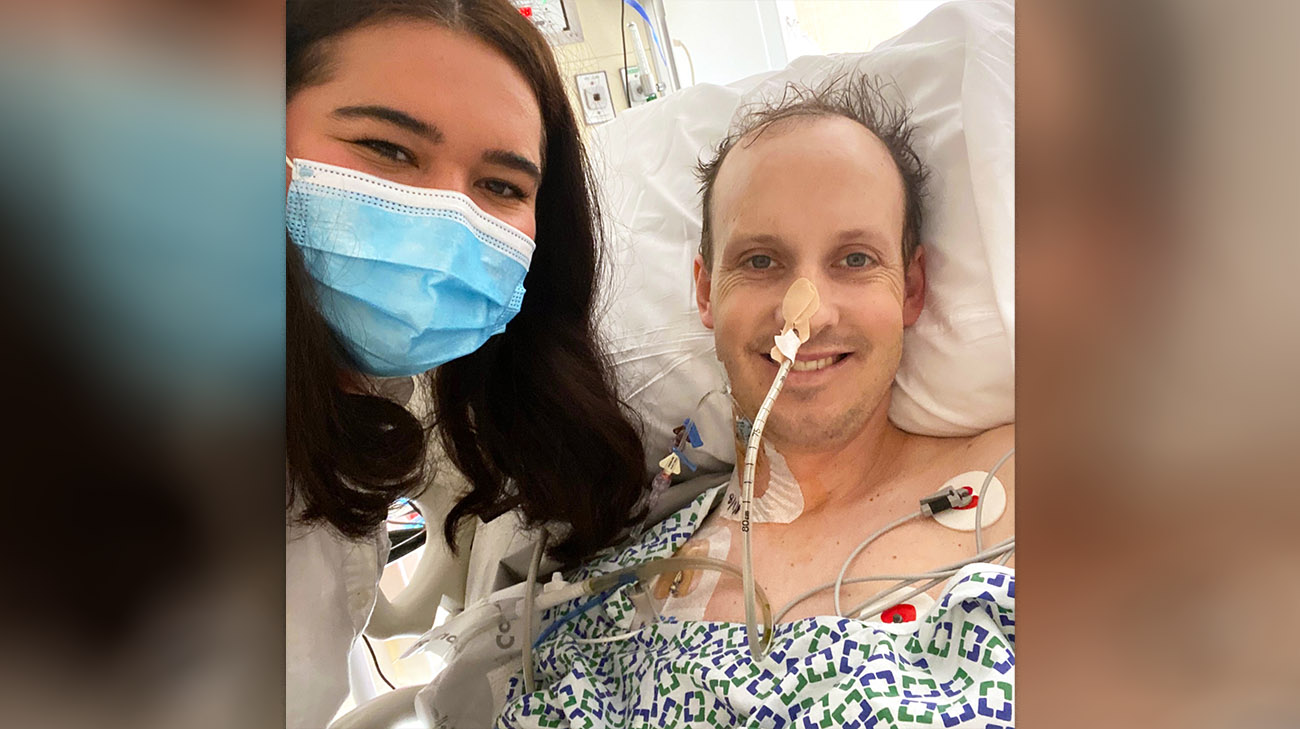
Chris with his wife, Alex, while Chris receives treatment at Cleveland Clinic. (Courtesy: Chris Barry)
“Dr. Vaidya was so confident on the call,” Chris says. “He was always professional, knowledgeable and reassuring. He listened and presented information so we could make the best decisions together.”
Intestinal transplants are rare, according to Dr. Vaidya. In 2023, Cleveland Clinic’s Intestinal Transplant Program in Ohio was the largest program in the United States with 18 intestine transplants.
Intestinal transplant surgeries have been successfully performed since the late 1980s, according to Dr. Vaidya, but he says it’s taken time for the message to get out that intestinal transplants may be a viable treatment option for patients.
After a series of meetings at Cleveland Clinic’s main campus in Cleveland, Ohio, to identify Chris’ support system, provide resources and discuss expectations related to the transplant surgery, Chris went through about two weeks of outpatient testing, including consultations, lab tests and imaging studies. Afterwards, Chris stayed in Cleveland to wait for a donor organ that was a match.
To prepare for the treatment, Dr. Vaidya worked with a team of specialists in gastrointestinal diseases, including hereditary colorectal cancer. The Sanford R. Weiss, MD Center for Hereditary Colorectal Neoplasia (the Weiss Center) at Cleveland Clinic plays a key role in collaborating with the transplant team, according to Dr. Vaidya. “They are a fantastic support to our patients, and we rely on their expertise for these complex surgical cases.”
On Aug. 1, 2021, Dr. Vaidya and team successfully performed the isolated small bowel transplant surgery on Chris. Intestinal transplant surgeries typically take 12-15 hours, Dr. Vaidya says.
Recalling when they first talked by phone, Dr. Vaidya says Chris was in “quite a critical situation.” Despite his dire state, Dr. Vaidya says Chris’ positive attitude helped him tremendously. “All doors had been shut on him, but he was still smiling when we met and stayed positive all the way through. He was stoic.”
When asked about his positive attitude, Chris says “it stems from my profound gratitude for simply being alive and appreciating the life I have.”
The transplant program team monitors patients who undergo intestinal transplants for life, Dr. Vaidya says. “We do intestinal transplants so patients can get their quality of life back and get on with their lives.”
Chis is now doing just that. About three months after surgery, Chris returned to work as a civil engineer with the city of Belvedere in the San Francisco Bay area.
And he got back to running by taking it slowly.
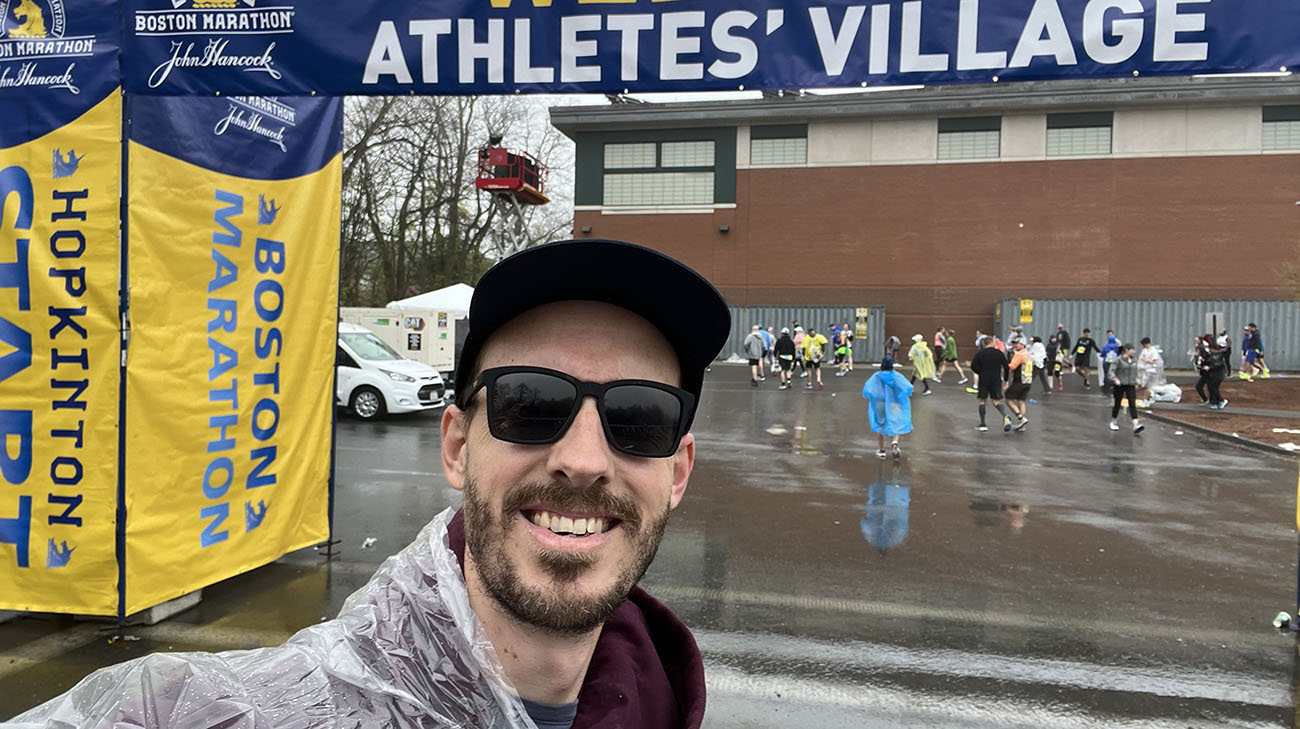
Chris running the Boston Marathon in 2023. (Courtesy: Chris Barry)
Before getting sick, Chris says he was athletic. “But I had no endurance after the transplant. I listened to my body and did not push too much. I had to be adaptable.”
He became passionate about running to raise awareness of rare diseases, like FAP and desmoid tumors, and to raise funds for research of rare diseases.
In 2023, Chris ran the Boston Marathon – his first marathon -- 18 months after his transplant surgery. He participated as part of the National Organization for Rare Diseases (NORD) Running for Rare team. He said he was proud to finish it and was not concerned about how long it took. Additionally, he raised about $8,000 for rare disease research.
In April 2024, he ran the Paris Marathon for Sarcoma UK, a British bone and soft tissue cancer charity. “The teams were very supportive," he says. “They helped me out a lot.”
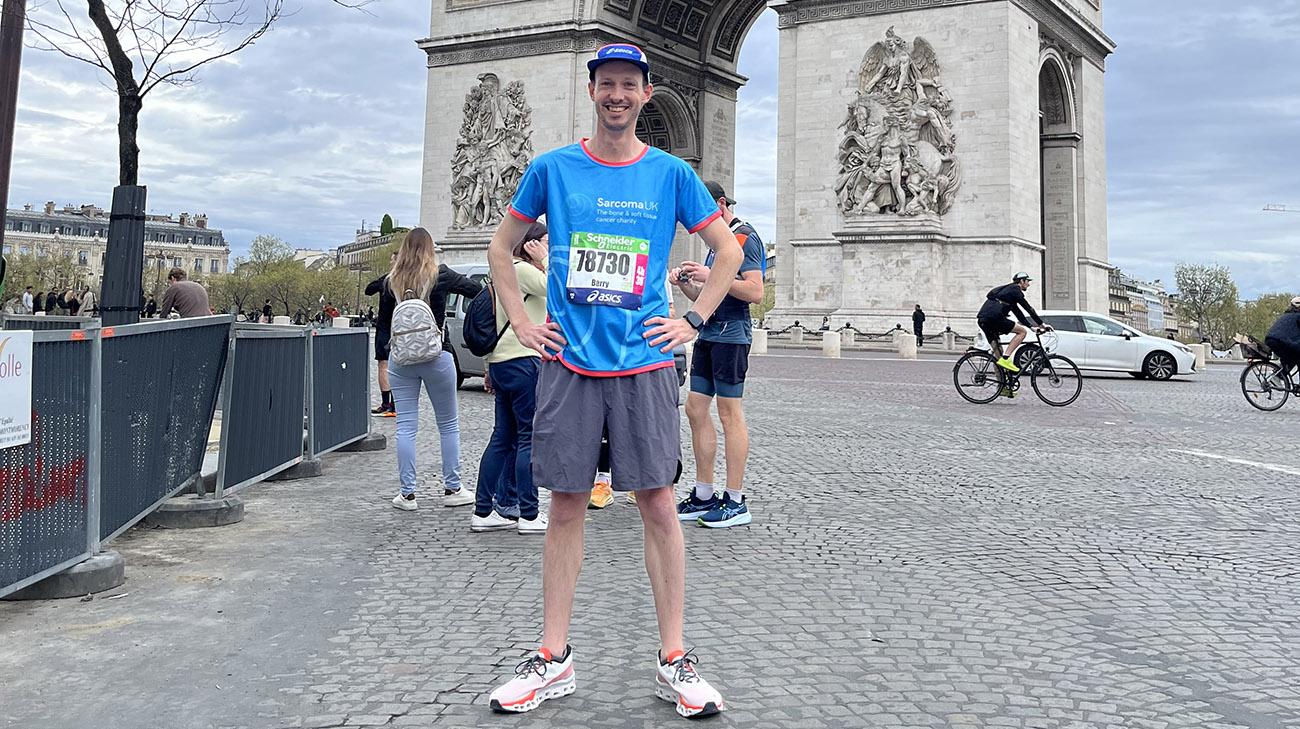
Chris in April 2024, while participating in the Paris Marathon for the organization Sarcoma UK. (Courtesy: Chris Barry)
He also has spoken at the Desmoid Tumor Research Foundation and NORD. “I’m happy to share my story and provide hope for others with rare diseases.” Chris says he wants to “turn a negative into a positive” through advocacy.
Organ transplantation offers a second chance at life to people of all ages who have life-threatening diseases or injuries to their vital organs. But the need for organ donations far exceeds the available supply. In the U.S., more than 100,000 people are waiting for a life-saving organ transplant on any given day. But only about 40,000 transplants take place any given year. Stories like Chris' serve as a reminder of the powerful impact one generous donor and their family can make.
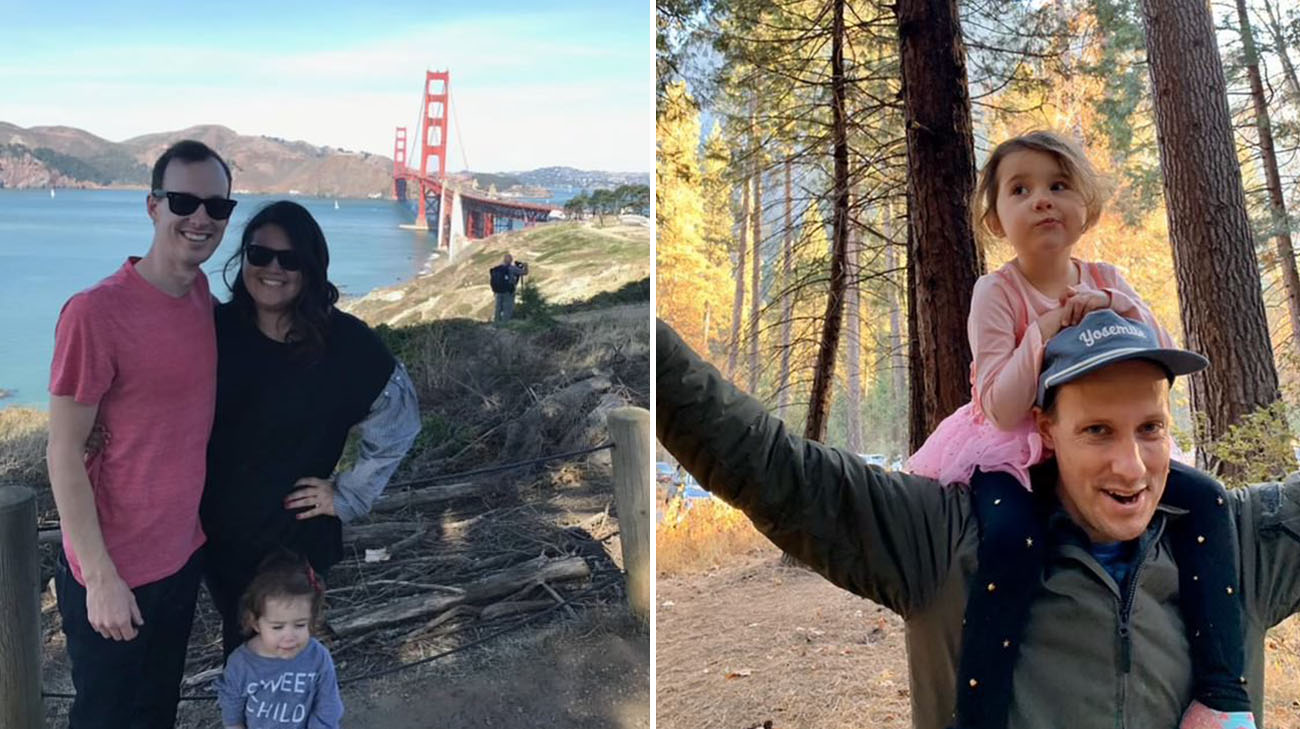
Dr. Vaidya says, “Chris was a young man who had gone through a bad patch in life. It was a random chance suggestion that led him to Cleveland Clinic, which led to an absolute and positive change in his life.”
Chris is enjoying life and time with his family. (Courtesy: Chris Barry)Chris is embracing that change. He is spending time with his wife and two young daughters. They enjoy traveling, being outdoors and going to the beach. “I want to enjoy life and take advantage of the time I have.”
Related Institutes: Digestive Disease & Surgery Institute

